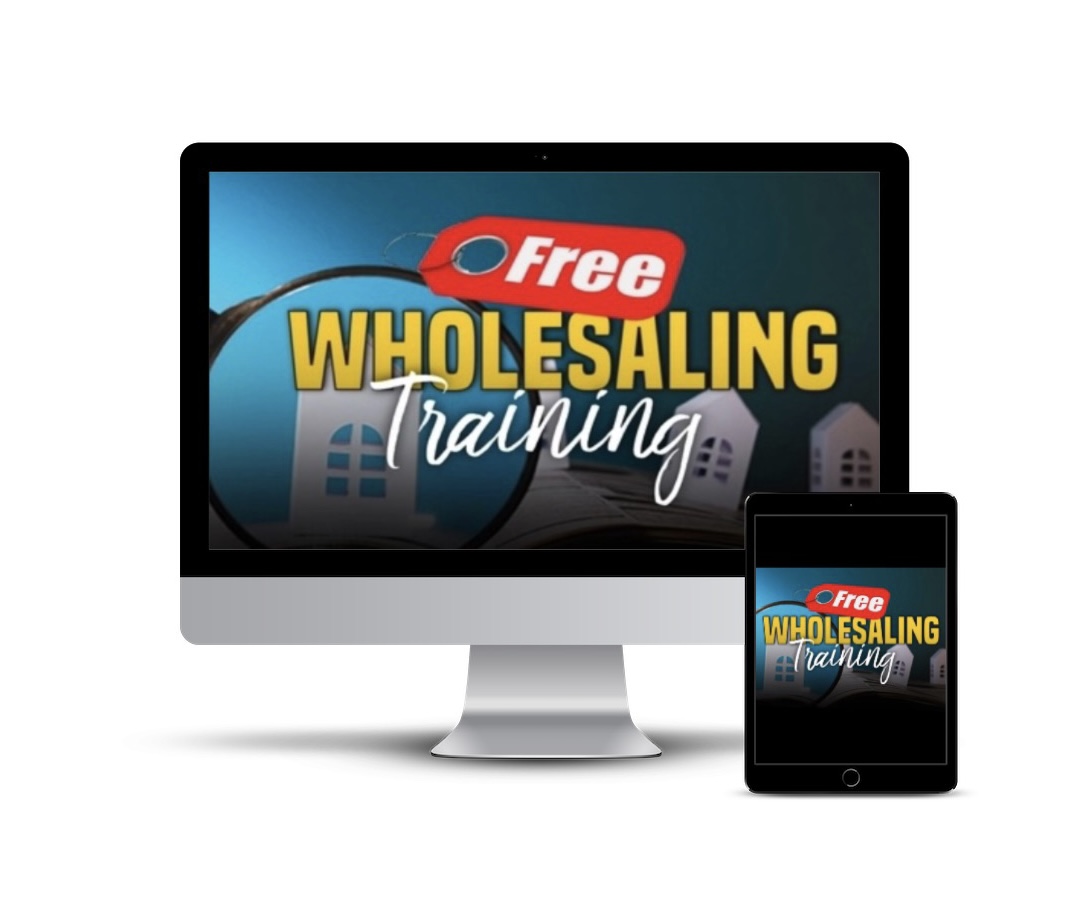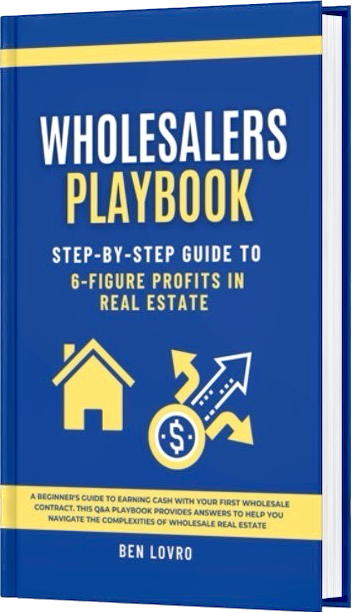FREE WHOLESALING COURSE
Get The Exact Blueprint To Launch And Grow A Successful Real Estate Wholesaling Business


Ideal Properties for Wholesaling: What to Look For
Introduction
Wholesaling real estate is an exciting and potentially lucrative venture, but it's essential to identify the right properties to maximize your chances of success. The key to successful wholesaling lies in finding ideal properties that attract both motivated sellers and eager buyers.

Understanding Wholesaling
Understanding wholesaling in real estate is essential before diving into this business venture. Wholesaling operates through a straightforward three-step process. Firstly, wholesalers source deals by identifying distressed or undervalued properties. Second, they negotiate purchase contracts with property sellers, usually at prices significantly below market value.
Wholesalers assign these contracts to real estate investors or buyers and earn an assignment fee without ever taking ownership of the property. This method requires a keen eye for finding motivated sellers and properties with the potential to be sold at a profit. An understanding of wholesaling's fundamental principles is key to success in this dynamic and potentially lucrative field. Wholesaling involves a three-step process:
Sourcing Deals: Wholesalers identify distressed or undervalued properties that have the potential to be sold at a profit.
Negotiating Contracts: They negotiate purchase contracts with property sellers, typically at a price significantly below market value.
Assigning Contracts: Wholesalers then assign these contracts to real estate investors or buyers, earning a fee (assignment fee) for their efforts, without ever owning the property.
Ideal Property Criteria
When searching for ideal properties in the realm of wholesaling, it's vital to have specific criteria in mind. These criteria include properties with motivated sellers who are eager to sell quickly, often due to financial difficulties or distress. Ideal properties are typically below market value, offering room for negotiation and profit. Clear property titles with no legal issues are essential to ensure smooth transactions.
The location and neighborhood's appeal, proximity to amenities, safety, and school districts are also critical factors to consider. Additionally, property condition, versatility for multiple exit strategies, and alignment with market demand contribute to the ideal property criteria for successful wholesaling. Here are the key factors to consider:
1. Motivated Sellers
The foundation of successful wholesaling is finding motivated sellers. These are property owners who are highly motivated to sell quickly, often due to financial difficulties, distress, or the need to relocate. Signs of motivated sellers include:
Absentee Owners: Owners who don't live in the property they're selling may be more motivated to sell quickly.
Probate or Inheritance: Properties inherited by individuals who may not wish to maintain or manage them.
Foreclosures or Pre-foreclosures: Owners facing foreclosure often seek fast sales to avoid losing the property to the bank.
Expired Listings: Properties previously listed on the market but didn't sell, indicating a potential willingness to negotiate.
2. Below Market Value
Ideal properties for wholesaling are those that can be acquired significantly below their market value. This allows room for wholesalers to assign contracts at a discount while still providing value to buyers. Look for:
Distressed Properties: Homes in need of significant repairs or renovations can often be purchased at a discount.
Off-Market Properties: Properties not publicly listed on the Multiple Listing Service (MLS) may offer more negotiating flexibility.
Motivated Sellers: Motivated sellers are more likely to agree to lower prices.
3. Clear Title and No Legal Issues
Ensure that the property has a clear title with no legal issues or encumbrances that could complicate the transaction. A clean title makes the wholesaling process smoother and minimizes the risk of disputes.
4. Location and Neighborhood
While distressed properties can be found in various locations, it's essential to consider the neighborhood's appeal. Factors to assess include:
Proximity to Amenities: Properties near schools, shopping centers, public transportation, and other amenities are often more attractive to buyers.
Safety and Crime Rates: A safe neighborhood is crucial for buyer interest and property value.
School District: Properties in good school districts tend to have higher demand.
5. Property Condition
Properties in varying states of disrepair can be excellent candidates for wholesaling. However, assess the level of renovation required and consider whether it aligns with your target buyers' preferences.
6. Multiple Exit Strategies
Look for properties that offer multiple exit strategies. This means you can wholesale the property to different types of buyers, such as investors or homebuyers. Versatility increases your chances of finding a buyer quickly.
7. Market Demand
Consider the current market conditions and demand for specific property types. Properties that align with current market trends and buyer preferences are more likely to sell quickly.
Property Search Strategies
Property search strategies are essential when looking for real estate. Whether you're a first-time buyer or an experienced investor, a well-thought-out approach can make a significant difference. Start by defining your goals and budget. Research neighborhoods and consider factors like proximity to schools, amenities, and transportation.
Engage a real estate agent for their expertise and access to listings. Attend open houses and view properties to get a feel for them. Don't rush; patience is key. When you find a property that meets your criteria, conduct thorough inspections and due diligence.
Negotiate effectively to secure the best deal. A strategic approach can lead to finding the perfect property for your needs. Now that you know the criteria for ideal properties, here are effective strategies to find them:
1. Networking
Build a strong network of real estate professionals, including agents, investors, and fellow wholesalers. Networking can lead to off-market property opportunities and access to motivated sellers.
2. Direct Mail Marketing
Direct mail marketing is a strategic approach used by businesses to reach their target audience through physical mail, such as postcards, letters, and catalogs. Unlike digital marketing, which relies on online channels, direct mail marketing involves sending promotional materials directly to potential customers' mailboxes.
This method allows companies to create personalized and tangible connections with their audience. Direct mail campaigns can include product offers, event invitations, or informational brochures. While it may seem traditional in the digital age, direct mail marketing remains effective for businesses aiming to engage with specific demographics and achieve measurable results.
Implement targeted direct mail marketing campaigns to reach property owners who may be motivated to sell. Craft compelling messages that highlight your ability to provide solutions.
3. Online Resources
Online resources have become indispensable tools for modern education and information access. These digital assets encompass a vast array of websites, databases, and platforms that offer a wealth of knowledge, from academic research and e-books to instructional videos and interactive courses.
They provide convenience and flexibility, allowing learners to access information anytime, anywhere. Furthermore, online resources facilitate collaborative learning and connect individuals with experts worldwide. Whether you're a student seeking academic articles or a professional looking for industry insights, the internet's treasure trove of online resources empowers individuals to expand their horizons and acquire knowledge efficiently and effectively.
4. Drive for Dollars
The "Drive for Dollars" is a strategy often employed by real estate professionals, particularly in the field of property investment and wholesaling. This strategy involves physically driving through neighborhoods and areas in search of distressed or vacant properties that may be ripe for investment opportunities.
The goal is to identify properties that show signs of neglect or disrepair, which may indicate motivated sellers. Once these properties are identified, real estate professionals can reach out to the owners and potentially negotiate favorable deals. This strategy requires a keen eye for spotting properties with potential, making it a popular technique in the real estate industry.
5. Public Records
Public records, a vital component of government transparency, encompass a wide array of documents and information accessible to the public. These records serve as a cornerstone of democracy by providing citizens with the means to access government actions, decisions, and data. Common types of public records include birth and death certificates, property records, court proceedings, and government contracts.
The availability of public records fosters accountability, informs citizens, and supports various legal and administrative processes. While public records are generally open to all, there may be exceptions and regulations governing their access, ensuring that sensitive information remains protected while upholding the principles of open government.
6. Real Estate Wholesaler Platforms
Real estate wholesaler platforms are becoming increasingly important in the world of property transactions. These platforms serve as intermediaries, connecting real estate wholesalers with potential buyers and investors. Wholesalers, who typically secure properties at discounted prices, use these platforms to showcase their offerings.
On the other hand, buyers and investors leverage these platforms to discover lucrative real estate deals. The convenience and accessibility offered by these platforms have made them a popular choice in the real estate industry. As technology continues to shape the sector, real estate wholesaler platforms are expected to play a significant role in facilitating property transactions and investments.
Due Diligence
Once you've identified potential properties that meet your criteria, it's essential to conduct thorough due diligence:
Property Inspection: Assess the property's condition and estimate repair costs accurately.
Title Search: Verify the property's title for any liens or legal issues.
Market Analysis: Analyze the local real estate market to determine the property's potential value and demand.
Legal Consultation: Seek legal counsel to ensure all contracts and agreements are sound and legally compliant.
Conclusion
Wholesaling real estate offers exciting opportunities for profit, but success hinges on finding ideal properties that meet specific criteria. Identifying motivated sellers, targeting properties below market value, and considering factors like location, condition, and market demand are vital.
Utilize effective property search strategies, conduct thorough due diligence, and network within the real estate industry to source potential deals. Remember that wholesaling requires persistence, dedication, and a keen eye for properties that align with your investment goals. With the right properties in your portfolio, you can unlock the full potential of your wholesaling business and pave the way for continued success in the real estate market.

Search Blog
Year
Month



